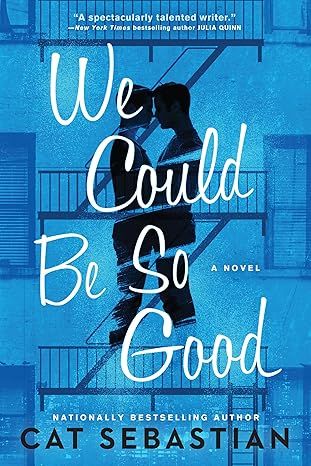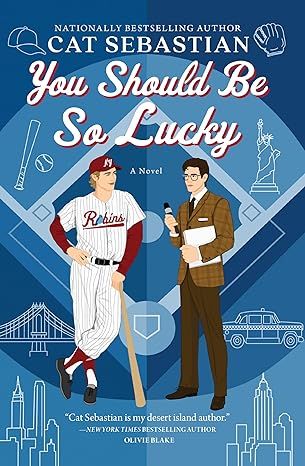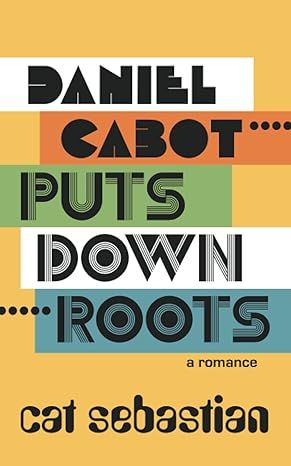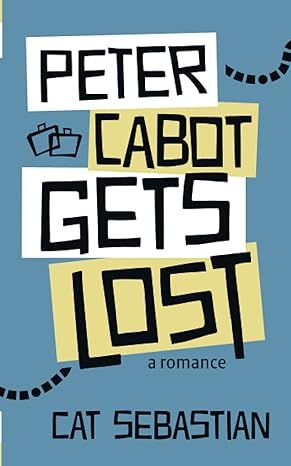We Could Be So Good: A NovelAudiobook
4.6
-
1,336 ratings
A New York Times Notable Book of 2023
A New York Times Books Review Best Romances of 2023 pick • Apple Books’ Best Books of the Month • Amazon Best Books of the Month Editor’s Pick, Romance • An NPR “Books We Love” • Library Journal Romance Pick of the Month • LibraryReads Hall of Fame: June 2023 • Publishers Weekly Best Romances of 2023
Casey McQuiston meets The Seven Husbands of Evelyn Hugo in this mid-century grumpy/sunshine rom-dram about a scrappy reporter and a newspaper mogul’s son "‘for Newsies shippers,’ [that] absolutely delivers” (Dahlia Adler, Buzzfeed Books).
“A spectacularly talented writer!” —Julia Quinn
Nick Russo has worked his way from a rough Brooklyn neighborhood to a reporting job at one of the city’s biggest newspapers. But the late 1950s are a hostile time for gay men, and Nick knows that he can’t let anyone into his life. He just never counted on meeting someone as impossible to say no to as Andy.
Andy Fleming’s newspaper-tycoon father wants him to take over the family business. Andy, though, has no intention of running the paper. He’s barely able to run his life—he’s never paid a bill on time, routinely gets lost on the way to work, and would rather gouge out his own eyes than deal with office politics. Andy agrees to work for a year in the newsroom, knowing he’ll make an ass of himself and hate every second of it.
Except, Nick Russo keeps rescuing Andy: showing him the ropes, tracking down his keys, freeing his tie when it gets stuck in the ancient filing cabinets. Their unlikely friendship soon sharpens into feelings they can’t deny. But what feels possible in secret—this fragile, tender thing between them—seems doomed in the light of day. Now Nick and Andy have to decide if, for the first time, they’re willing to fight.
Read more
Kindle
$9.99
Available instantly
Audiobook
$0.00
with membership trial
Paperback
$15.19
Audio CD
$28.10
Ships from
Amazon.com
Payment
Secure transaction
ISBN-10
0063272768
ISBN-13
978-0063272767
Print length
384 pages
Language
English
Publisher
Avon
Publication date
June 05, 2023
Dimensions
5.31 x 0.86 x 8 inches
Item weight
2.31 pounds
Frequently bought together
Product details
ASIN :
B0BDCSP3YG
File size :
6027 KB
Text-to-speech :
Enabled
Screen reader :
Supported
Enhanced typesetting :
Enabled
X-Ray :
Not Enabled
Word wise :
Enabled
Editorial reviews
“It’s not about the events [of the plot], it’s about the going through [them]. And the going through is wonderful: At one point a character makes some soup, and then later a different character makes more soup, and here I am weeping and prostrate because the reader knows what that soup means. … Queer oppression, the civil rights movement, white supremacy—these are tangible contexts in this novel, but they are not the subject. The subject: joy as praxis, love as liberation. You can’t do the big rebellions if you can’t start with the small ones.” — New York Times Book Review
“A spectacularly talented writer!” — Julie Quinn, New York Times bestselling author of the Bridgerton series
“This historical romance is billed as being ‘for Newsies shippers,’ and it absolutely delivers.” — Dahlia Adler, Buzzfeed Books
“Cat Sebastian is my desert island author—I would follow her through any era, any trope, any time. There is a lightness to Sebastian’s work that makes every page sing; every beat of repartee is bright with wit, every quiet moment impossibly, ardently romantic. It’s the kind of book that ends all too soon, because what could ever be better than life on Cat Sebastian’s page?” — Olivie Blake, author of the New York Times bestselling Atlas series
"Sebastian is the master of slow-burning sizzle with a realistic touch." — Boston Globe
“Cat Sebastian is a queen of queer historical romance…. [She] never disappoints.” — Entertainment Weekly
“When Cat Sebastian is creating romance, every serve is an ace. … [The] slow-burning sparks are organic, joy inducing and earned.” — NPR
“[A] tender love story.” — Popsugar
“Irresistible…. There’s plenty of conflict to keep the pages flying, but it’s the scenes of Nick and Andy’s cozy domesticity that truly shine. This wonderful period romance will leave readers just as giddy as its leads.” — Publishers Weekly (starred review)
“Well, this is just great. … Few authors have Sebastian’s flair for deftly exploring the intricate, often messy nature of human relationships, from moments of heartbreak to happiness, with such insight and compassion. While the vividly evoked 1950s setting is new for this author, everything else about this sublimely romantic love story, including the dryly witty writing and graceful characterization, is signature Sebastian.” — Booklist (starred review)
“Fans of the author’s books will absolutely not want to miss this one. This sweetly angsty novel about two people finding themselves and figuring out a way forward together will appeal to anyone who enjoys reading opposites-attract romances with found family subplots.” — Library Journal (starred review)
“[We Could Be So Good] reads like a love letter to the queer pulp novels of the era, but with an infusion of hope not often seen in literature about the time period. … With We Could Be So Good, Sebastian adds a tender, heartening stunner of a love story to her already-impressive body of work.” — BookPage
“[T]he focus remains on the revolutionary act of queer joy…. A found family element contributes to the hopefulness and heart that are the cores of this story. A vividly portrayed midcentury romance filled with queer contentment.” — Kirkus Reviews
"Cat Sebastian has a place on my keeper shelf!” — Tessa Dare, New York Times bestselling author
Read more
Sample
Part I
Nick
March 1958
Nick Russo could fill the Sunday paper with reasons why he shouldn’t be able to stand Andy Fleming. Not only is he the boss’s son, but rumor has it he’s only slumming it at the New York Chronicle city desk—a job Nick has been hungry for ever since he first held a newspaper in his hands—because his father threatened to cut off his allowance. He can’t type. He roots for the Red Sox. He has no idea how to buy subway tokens. He has this stupid habit of biting his nails and then, realizing what he’s doing, abruptly stopping and looking around furtively to check if anyone saw him. He blushes approximately five hundred times a day. He has a cluster of tiny freckles at the corner of his mouth shaped like a copy editor’s caret and, since Nick can’t stop looking at them, those freckles are going to ruin his career.
With covert glances across the newsroom, Nick catalogs all the things he doesn’t like about Andy and stores them up like a misanthropic squirrel. He’s Nick’s age, twenty-five or so, but has definitely never done an honest day’s work in his life, probably not even a dishonest day’s. He’s gangly, not short, but maybe a buck thirty soaking wet. His hair is that in-between color that on women gets called dishwater blond and on men isn’t called anything at all because it usually looks brown after being slicked back or combed smooth. But Andy doesn’t slick his hair back. He parts it on the side like a six-year-old. Nick doesn’t bother with any of that garbage, either, but that’s only because his hair is curly and has ideas of its own. Nick’s hair laughs in the face of pomade.
It’s offensive, is what it is, that the boss’s son thinks he’s going to play at being a cub reporter. It’s possibly even more offensive than the story behind how Nick got the job, which owes more to the old city desk editor going senile than anything else, but Nick isn’t going to think about that right now.
The point is, Nick knows how to hate people. He’s no stranger to a grudge. He ought to spend the rest of his career resenting the ever-living daylights out of Andy.
Instead he lasts less than a week. Less than a day, even. About forty-five minutes, to be exact, and that’s Andy’s fault, too.
Nick meets his doom in the Chronicle morgue, a godforsaken maze of filing cabinets on the third floor where seventy years of clippings are stored in some loose approximation of alphabetical order. When he sees Andy there, he supposes he has to give the kid some credit for knowing that the morgue exists in the first place, let alone where to find it. He’s just congratulating himself on being gracious when he realizes that Andy doesn’t have any of the file drawers open. Instead he’s standing there, tugging at a drawer handle and swearing.
Well, he’s saying things like rats and jeez and Nick thinks there might even have been a gosh in there.
“Can I help you?” Nick asks.
“Oh crud,” Andy says, turning the bright pink of Coney Island sunburns. And then he collects himself, or at least he tries to. Nick watches it happen, watches the embarrassment subside and get replaced with a mask of affability. “Nick, right?” Andy asks. “This is embarrassing, but I seem to have gotten myself into a predicament.” He gestures at the filing cabinet, where the end of his tie is stuck inside a closed drawer.
The first thing Nick notices is that Andy’s tie is pale yellow with tiny white flowers scattered across it. Nick’s own ties run the gamut from gray to blue to gray-blue to one that even has gray and blue stripes, not because he’s particularly attached to those colors but because that’s what normal people wear. Nick has spent years making sure that when people look at him, they don’t see anything that sticks out like a sore thumb—they don’t see anything at all, they hardly even see a person, just a man in a suit.
Maybe when you’re the heir to a publishing fortune, you don’t need to worry about that sort of thing. Instead you can spend your time dropping out of law school and dropping out of business school and then flitting between the capitals of Europe for a couple years, not that Nick has made it a point to learn all about Andy’s history or anything.
The second thing Nick notices is that the drawer is jammed. Of course it is. Nothing in the Chronicle building works as it’s supposed to, from door handles that require special jiggling to stacks of carbon paper that come tumbling down if you aren’t careful to a cafeteria worker who prays loudly for you in Hungarian if you don’t eat your potatoes. Figuring this out is a sort of organic hazing process that junior reporters and copyboys have to endure. It goes hand in hand with learning how the newsroom works; by the time you’ve mastered the hot-water tap in the eighth-floor men’s room, you probably have a byline.
But nobody can haze the owner’s son, even if he is here unwillingly. Nick isn’t sure, though, what the alternative is; it’s not like there’s an operator’s guide to how to survive in this place, and even if there were, it would be as thick as a phone book.
“There’s a trick to opening it.” Nick has to step close to Andy to execute the trick—close enough that he can smell aftershave, close enough that he can hear how fast Andy’s breaths are coming. Jesus, the kid must have been in a panic when he thought he was trapped down here, tied by the neck to a couple hundred pounds of metal and old newspapers.
Nick shoves the cabinet with his shoulder and then pounds the lower left corner of the stuck drawer with his fist. It pops open, rolling out smoothly, as if judging anyone who ever doubted it.
“Oh gosh, thanks,” Andy says. “And here I was, trying so hard to make a good impression. I offered to come down here and get the clippings myself instead of sending a copyboy.”
Nick, fool that he is, recognizes this as both a confession and a dare. Andy Fleming—Andrew Fleming the fucking Third—is daring Nick to do the most clichéd thing someone in his position can possibly do and make friends with the boss’s son.
Nick has never known how to turn down a dare.
“Next time,” Nick says, “send a copyboy.”
“Right,” Andy says, sounding abashed. He makes a useless effort to smooth his tie, which is now hopelessly creased and probably ruined, and turns toward the elevators. “Thanks, Nick.”
“Wait. Stay still.” Nick can’t send the kid back to the newsroom looking like he’s been mugged. He reaches out and smooths Andy’s tie as best as he can, then straightens his lapels, which had gone all askew when he battled the filing cabinet. “If you button your jacket, it’ll hide the worst of the damage,” he suggests.
Andy flashes Nick a smile, a thousand watts of professionally straightened teeth, and it’s like a two-by-four to the head. It takes Nick a minute to arrange his face.
April 1958
From there, it’s only natural for Nick to invite Andy out for drinks with the handful of reporters who’re waiting to see whether they need to rewrite anything before deadline. And then after that, what can Nick do but keep an eye out for Andy? He can’t let the kid wander around unsupervised, can he? It wouldn’t do to let one of the copyboys find his desiccated skeleton shackled to a filing cabinet or trapped in the fire stairs. Workplace morale would plummet.
And it’s not like anybody said, “Russo, babysit the boss’s son,” but when Nick gets sent out to cover a story, Andy tags along as often as not. There’s a set of arcane and unspoken rules governing who sits where in the rows and rows of desks in the Chronicle’s newsroom, but Nick clears off the desk facing his own, all but shoves Andy into the chair, then glares around the room, silently daring anyone who thinks they’re going to argue with him.
“Why do you keep calling me ‘kid’?” Andy asks one day as they’re walking back from City Hall. “I checked your file and we’re both twenty-five.”
“I have a file?” Nick asks, not sure whether to be annoyed or weirdly flattered that Andy has been prying into whatever files the Chronicle keeps on its employees.
“Everyone has a file.”
“I didn’t realize we were the same age,” Nick lies.
“Did you know the copyboys have a betting pool about how many times you’ll smile in a week? The over-under’s two. Two.”
“There’s too much goddamn gambling in the newsroom,” Nick says, because it’s true—a newspaper shouldn’t have its own numbers runner, that’s just wrong—and also because he doesn’t want to let on that he’s kind of impressed that Andy’s in good enough with the copyboys to know about their secret bets.
“Is this part of your grizzled old reporter routine?” Andy asks, narrowly avoiding a puddle only because Nick grabs him by the sleeve and hauls him out of the way. “The one where you act like an ink-stained wretch, made of nothing but newsprint and subway tokens and paper cups of coffee?”
That’s . . . alarmingly close to the image that Nick tries to cultivate. “It’s because if I start thinking of you as an actual adult, I’ll start wondering why you never have a pen. Or your keys. Or why you get east and west confused.”
Something like hurt flickers across Andy’s face and Nick wants to take back whatever it was he said, but Andy’s good-natured mask is back in place. “I never confuse east and west. I just never know which direction I’m facing, so I can’t possibly guess where all the rest of the directions are. And that reminds me.” He gives a self-deprecating laugh that doesn’t sound in the least cheerful. “I lost my keys again.”
“No, you didn’t.” Nick digs into his pocket and pulls out a key ring. “Sorry. Forgot to mention it. One of the girls on the fourth floor found it and gave it to me to give to you.”
Andy blushes hard, and Nick wonders which of the reporters on the fourth floor he has his eye on. That’s where the women in fashion, food, and furnishings have their desks. Hmm.
“That’s three times this week.” Andy sighs, taking the keys and sticking them in his pocket.
Actually, it was five times, and six the previous week, but Nick doesn’t mention it.
“Don’t you have a doorman you can leave your keys with?” Nick asks.
“It’s too mortifying. He’s known me since I was a baby. And he knew my mother. I can’t admit to him that I can’t even keep track of a key ring.”
Nick guesses that Pulitzer-winning war correspondents don’t lose their keys much. But this is the first time Andy’s mentioned his mother. She died last fall, and Nick only knows this because everybody knows it—the Chronicle even ran a two-column obituary, despite her being the publisher’s ex-wife.
The next day, Nick comes to work with a length of string. “Give me your keys,” he tells Andy.
Andy raises his eyebrows but complies. “This worked for my nephew,” Nick says, prying the single key off the ring and threading it onto the string. “He kept losing his keys because he always had his hands in his pockets. Whenever he took his hands out, he’d send his keys flying.” He ties a double knot, then holds out the resulting circle of string, the key dangling like a locket at the bottom. “Come here.” He loops the string around Andy’s neck, pulling his collar just loose enough to drop the key under his shirt. “Safe and sound.” He pats Andy’s chest, then pulls his hand away like he’s touched a hot stove. What the fuck. Nick knows to keep his hands to himself.
Andy’s hand goes up to his throat, but he stops himself and jams his hands in his pockets. He looks embarrassed, and Nick realizes that he might have got this all wrong—he never meant to make Andy feel like he couldn’t take care of himself.
“I mean, you don’t need to keep it like that,” Nick says. “Do whatever works for you. It’s just—it was bothering you, and I thought—”
“Thank you,” Andy says. “It was thoughtful of you.”
Nick wonders when the last time was that someone looked after Andy Fleming, before reminding himself that it’s none of his business.
Read more
About the authors
Cat Sebastian
Cat writes queer historical romance. In her spare time she acquires too many houseplants and misplaces things. She lives in a swampy part of the American south but also on twitter.
Visit Cat at CatSebastian.com
Top Cat Sebastian titles
View allBest Sellers
View all
The Tuscan Child
4.2
-
100,022
$8.39

The Thursday Murder Club: A Novel (A Thursday Murder Club Mystery)
4.3
-
155,575
$6.33

Sapiens: A Brief History of Humankind
4.6
-
140,302
$13.49

The Butterfly Garden (The Collector, 1)
4.3
-
88,556
$9.59

Things We Hide from the Light (Knockemout Series, 2)
4.4
-
94,890
$11.66

The Last Thing He Told Me: A Novel
4.3
-
154,085
$2.99

The Perfect Marriage: A Completely Gripping Psychological Suspense
4.3
-
143,196
$9.47

The Coworker
4.1
-
80,003
$13.48

First Lie Wins: A Novel (Random House Large Print)
4.3
-
54,062
$14.99

Mile High (Windy City Series Book 1)
4.4
-
59,745
$16.19

Layla
4.2
-
107,613
$8.99

The Locked Door
4.4
-
94,673
$8.53




